Overview
The article offers a thorough overview of CRM software, defining it as a strategic tool for managing client relationships and enhancing business efficiency through data analysis and automation. It acknowledges the common concerns businesses have regarding client management and emphasizes that effective CRM implementation can significantly improve client retention and sales growth. Furthermore, it is supported by statistics indicating projected market expansion and case studies showcasing productivity boosts from mobile CRM solutions. This means that businesses can leverage these tools not only to streamline their operations but also to foster stronger client relationships.
Introduction
In the dynamic landscape of modern business, the role of Customer Relationship Management (CRM) software has become increasingly vital. These innovative tools are not merely about managing customer data; they are strategic assets designed to enhance relationships, improve customer retention, and drive sales growth. As organizations navigate the complexities of customer interactions across various channels—be it through emails, social media, or direct communications—CRM systems provide a comprehensive view that empowers businesses to make informed decisions.
Furthermore, with the global CRM market projected to soar from $70.2 billion in 2024 to an astounding $178.7 billion by 2034, the significance of these systems cannot be overstated. However, the journey to successful CRM implementation is not without challenges, as many businesses grapple with user adoption and data management issues. This means that organizations must be strategic in selecting and implementing the right systems to enhance customer experience and satisfaction.
This article delves into the essential features, types, and benefits of CRM software, while also addressing the hurdles organizations face in this process.
Defining CRM Software: What It Is and Its Purpose
The definition of CRM software encompasses Client Relationship Management (CRM) software, which serves as a vital technology solution for managing interactions with both existing and potential clients. By leveraging data analysis of client history, CRM platforms aim to enhance professional relationships, particularly focusing on client retention and driving sales growth. These systems gather client data from various channels, including websites, telephone communications, email exchanges, live chat interactions, marketing materials, and social media platforms.
The CRM software definition underscores the primary goal of improving service relationships, facilitating client retention, and ultimately increasing sales by offering a comprehensive view of interactions and preferences. In 2025, the global CRM market is projected to expand significantly, growing from $70.2 billion in 2024 to an estimated $178.7 billion by 2034, reflecting a robust compound annual growth rate (CAGR) of 9.8%. This growth highlights the increasing reliance on CRM tools, illustrating the CRM software definition among enterprises seeking to enhance their client engagement strategies.
Recent statistics reveal that only 28% of organizations express satisfaction with their current tools for creating a centralized perspective of clients, pinpointing a critical area for improvement in CRM implementation. Successful case studies demonstrate that effective strategies based on the CRM software definition can lead to substantial enhancements in client relationships. For instance, businesses that have adopted mobile CRM solutions report productivity boosts of up to 50%, enabling teams to access essential client data on-the-go.
Expert insights emphasize the transformative potential of the CRM software definition in fostering loyalty. As organizations strive to improve retention rates, understanding the CRM software definition has proven essential for integrating CRM systems. In fact, companies that effectively utilize the CRM software definition often witness significant increases in client retention, as this definition includes tools that facilitate personalized communication and tailored service offerings.
Nick Rockwell, a Content Marketing Manager, noted that around 83% of senior executives indicated hesitation among personnel to integrate CRM software into their daily activities, highlighting a challenge in CRM adoption that warrants attention.
In summary, the CRM software definition reveals that it is not merely a tool for managing customer data; it is a strategic asset that empowers organizations to cultivate stronger relationships with their customers, ultimately resulting in sustained growth and success. Furthermore, platforms such as Kulud exemplify how automation in expense management can simplify processes for freelancers and small enterprises. Users can log in with their professional email, capture invoices and receipts, and select date ranges or enable automatic searches for efficient matching with bank transactions.
With features such as automated receipt capture, bank transaction matching, and easy accounting exports, Kulud allows users to concentrate on building client relationships while effectively managing their financial data.
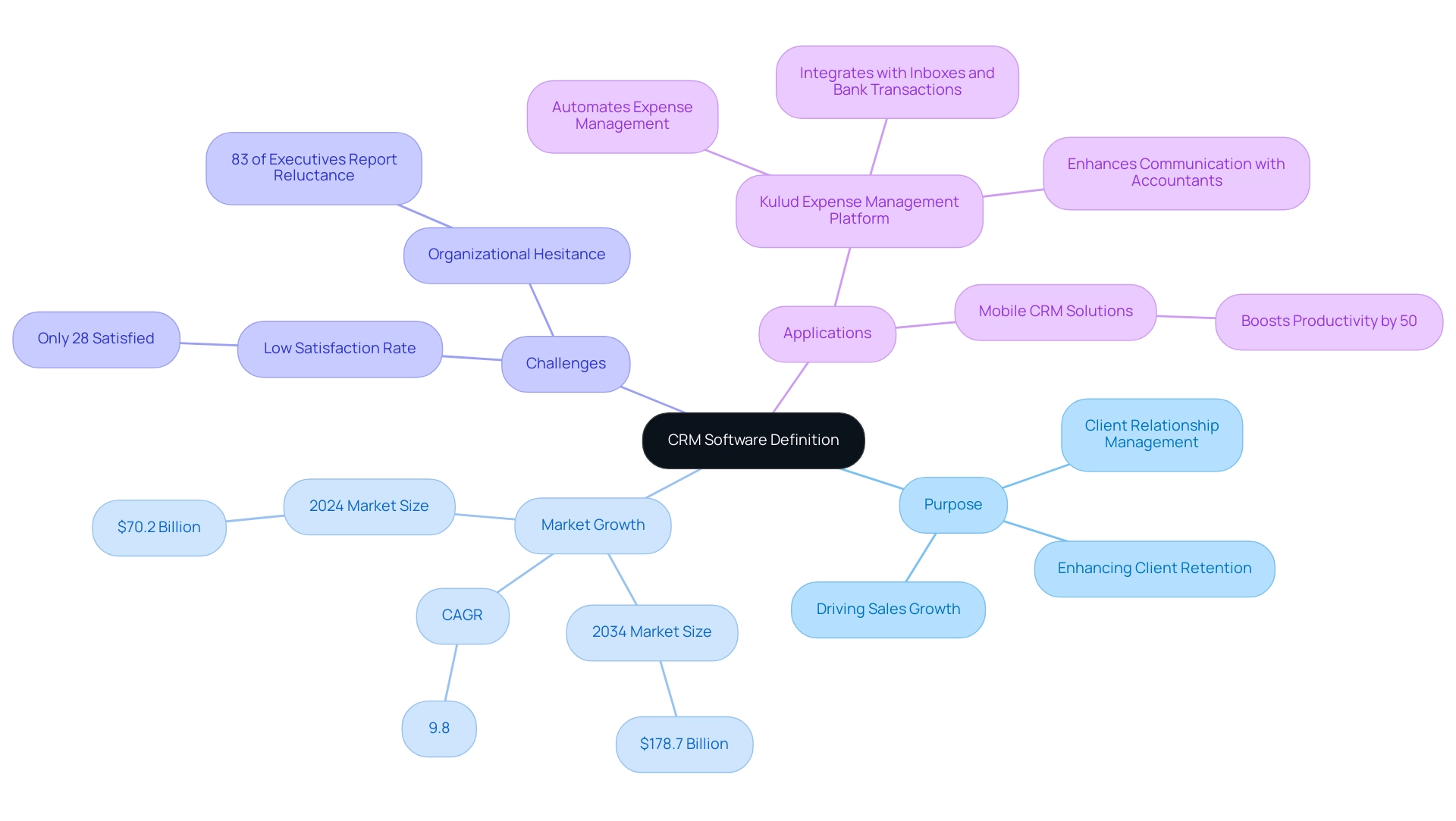
Exploring the Types of CRM Systems: Operational, Analytical, and Collaborative
The definition of CRM software encompasses essential tools for businesses, particularly freelancers and small business owners, categorized into three primary types: Operational, Analytical, and Collaborative.
Understanding the challenges freelancers face with expense management is crucial. Operational CRM emphasizes automating and optimizing processes involving clients, including sales, marketing, and service. This type of CRM is designed to enhance efficiency and improve client interactions, ultimately driving sales growth. By 2025, operational CRM systems are increasingly being adopted, with a significant percentage of small businesses reporting enhanced client experiences through automation.
Brands utilizing these CRM strategies have reported a success rate of 79% to 91% in improving client experience, highlighting the efficiency of operational CRM. In addition to this, Analytical CRM focuses on analyzing client data to inform decision-making and strategy formulation. By utilizing data analytics, businesses gain insights into consumer behavior, preferences, and trends, allowing for targeted marketing efforts and improved client retention strategies. Recent studies indicate that companies using analytical CRM have seen a marked increase in their ability to tailor services to meet client needs, resulting in higher satisfaction rates.
Collaborative CRM highlights the sharing of client information across various departments, fostering better communication and service delivery. This approach ensures that all teams, from sales to support, have access to the same client data, enhancing the overall experience. As we approach 2025, collaborative CRM systems are becoming essential as companies recognize the significance of a cohesive strategy for managing clients.
Current best practices for operational CRM in 2025 include integrating mobile solutions, as 43% of millennials prefer using mobile devices for customer service interactions. Furthermore, ongoing training for sales teams is crucial; companies that invest in tailored training programs see significant returns on investment and improved sales performance. Effective sales teams require ongoing, tailored training to enhance their performance, as highlighted in case studies on sales training statistics.
As the landscape of CRM continues to evolve, understanding the definition of CRM software, along with the distinctions and applications of operational, analytical, and collaborative CRM, will empower small enterprises to optimize their relationship strategies effectively. We encourage you to explore how these tools can enhance your business operations and improve your client management strategies.
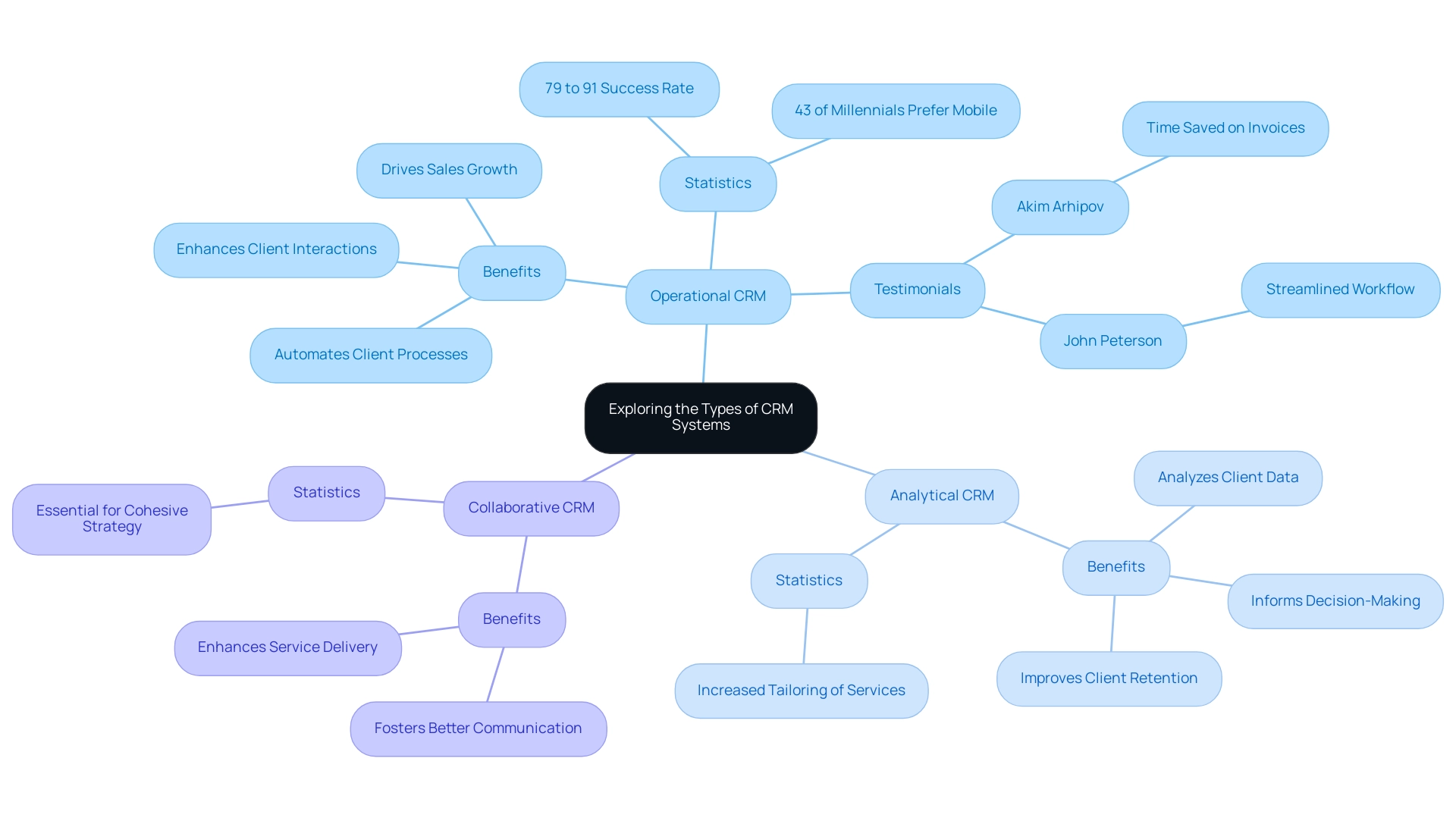
The Benefits of Implementing CRM Software in Your Business
The definition of CRM software highlights the multitude of advantages that implementing such tools offers, particularly for freelancers and small business owners. One significant benefit is the enhancement of client relationships. By centralizing client information, organizations can achieve a comprehensive view of interactions, enabling them to provide more tailored and efficient service.
In 2025, statistics indicate that organizations employing CRM tools have seen a marked improvement in customer satisfaction and retention rates, with many reporting a 30% increase in customer engagement. Furthermore, the worldwide AI in CRM market size is expected to reach $48.4 billion by 2033, underscoring the increasing importance of these technologies in the commercial environment.
Moreover, CRM systems streamline communication by automating routine tasks, allowing teams to redirect their focus toward strategic initiatives rather than getting bogged down in administrative duties. This shift is particularly advantageous for freelancers, who can devote more time to client work and development. The capability to monitor client interactions and preferences also promotes stronger connections, as companies can customize their strategies based on individual client needs.
In addition to enhancing client relationships, Kulud offers a secure and automated expense management solution that is especially beneficial for freelancers. To get started, users can log in with their business email, supported by Gmail, and add all their accounts. They can then capture invoices and receipts, select the date range, or activate the automatic search feature to match invoices with bank transactions.
By connecting their bank accounts, users can effortlessly match invoices with transactions, saving time and reducing manual sorting or downloads. Kulud also allows for easy exports for VAT or annual reports, simplifying the financial management process and ensuring seamless integration with accounting software.
The analytical capabilities of CRM systems further empower users by providing valuable insights into client behavior and market trends. For instance, case studies reveal that freelancers who adopted mobile CRM solutions experienced a 25% improvement in response times and a significant boost in data quality, ultimately strengthening their customer relationships. The mobile CRM market is anticipated to expand considerably, with projections hitting $58 billion by 2034, indicating the growing dependence on mobile technology in operational activities.
Expert insights underscore the importance of CRM in enhancing communication. As noted by industry leaders, effective CRM implementation can lead to a more cohesive team dynamic and improved client interactions. Georgi Knyazhev, a satisfied user, stated, "Kulud has transformed my accounting processes, allowing me to save time and streamline communication with my accountants."
By leveraging these systems, freelancers and small business owners can not only enhance their operational efficiency but also cultivate lasting relationships with their clients, paving the way for sustained growth and success in an increasingly competitive landscape. Additionally, taking a free trial of the CRM software allows users to evaluate its features and usability before making a commitment, further encouraging engagement with these valuable tools. Kulud's emphasis on automation, intuitive design, and security for user data establishes it as a pertinent example that aligns with the CRM software definition, demonstrating how it can assist users in managing their financial and client relationships.
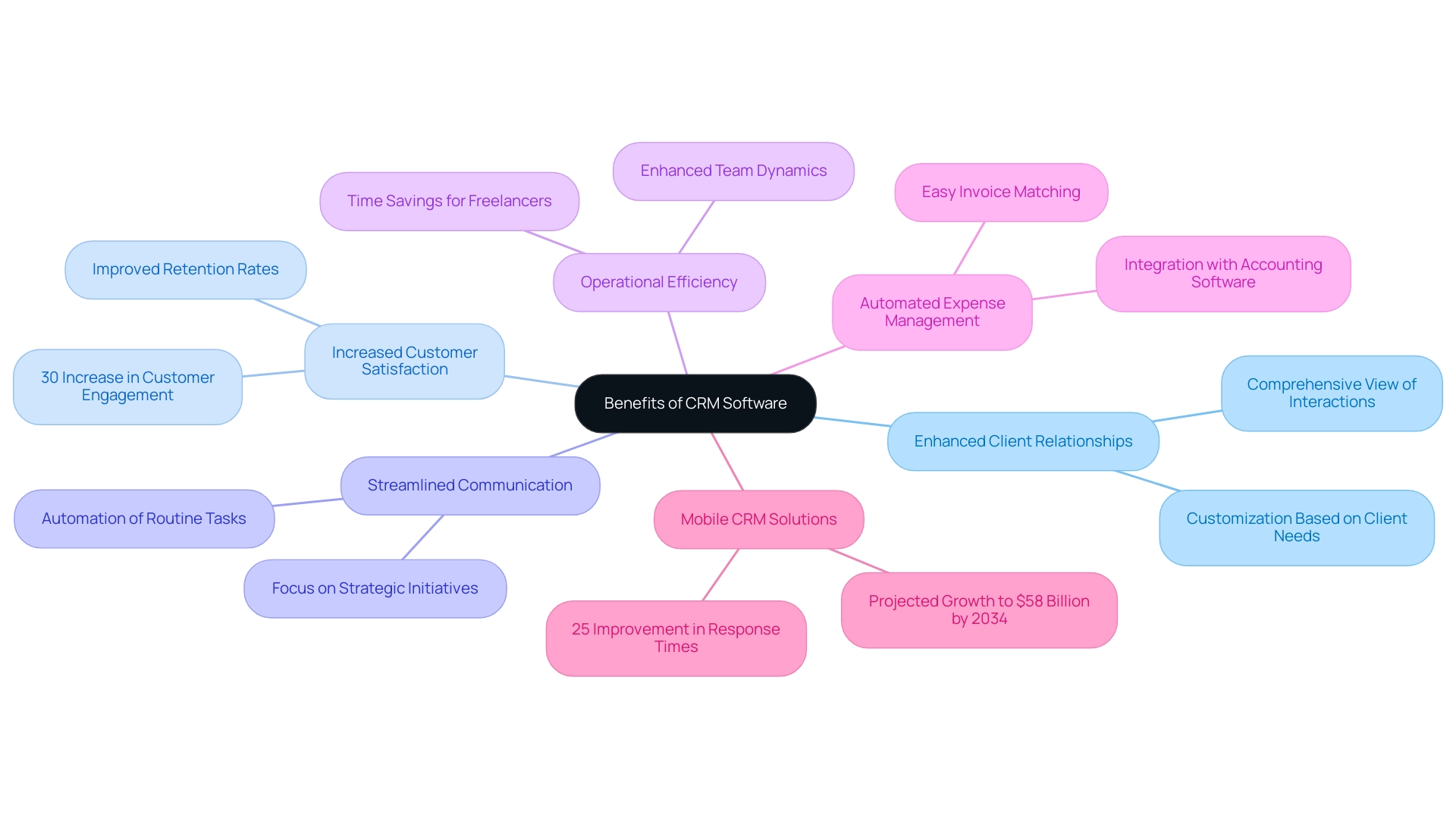
Essential Features of CRM Software: What to Look For
When selecting CRM software, small enterprises should prioritize essential features that enhance operational efficiency and client relationship management. Key functionalities include:
- Contact Management: This feature enables users to efficiently store and organize customer information, ensuring easy access and streamlined communication.
- Sales Automation: By automating repetitive tasks, sales automation simplifies the sales process, allowing teams to focus on building relationships rather than getting bogged down in administrative duties.
- Reporting and Analytics: Robust reporting tools provide valuable insights into customer behavior and sales performance, empowering organizations to make data-driven decisions that can significantly impact growth.
- Integration Capabilities: A CRM that seamlessly integrates with other tools and platforms enhances overall productivity, allowing organizations to create a cohesive workflow.
As the global CRM market is projected to exceed $80 billion by 2025, driven by digital transformation and a focus on customer-centric models, the importance of these features cannot be overstated. In fact, statistics indicate that 65% of companies adopt a CRM within their first five years, highlighting its critical role in modern organizational strategies. Furthermore, companies utilizing CRM solutions can expect at least a 30% revenue boost through improved sales processes and enhanced client satisfaction.
Successful case studies demonstrate that small enterprises implementing effective contact management systems see a marked improvement in customer engagement and retention. Georgi Knyazhev, a satisfied user, noted, "Kulud has transformed my accounting processes, allowing me to save time and streamline communication with my accountants." This testimonial underscores the value of effective CRM solutions in enhancing organizational operations.
As the landscape of CRM software continues to evolve, it will be crucial for small businesses to understand these essential features in order to thrive in a competitive market.
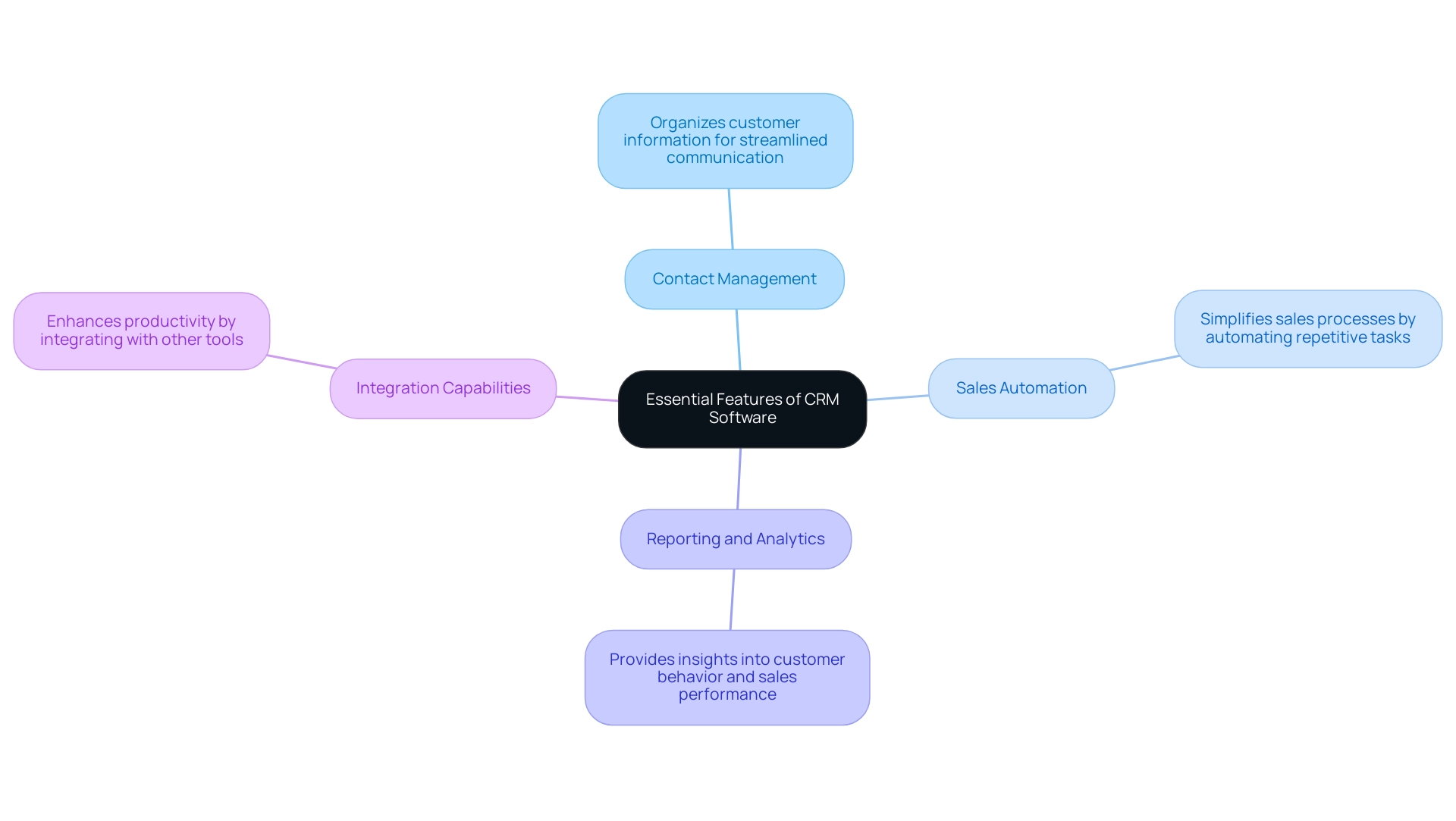
Navigating the Challenges of CRM Implementation
Implementing a CRM software definition can present various challenges, especially in 2025, where resistance to change remains a significant hurdle. Many employees may hesitate to abandon established procedures, leading to reluctance in adopting new methods. To effectively address this resistance, involving team members in both the selection and implementation phases is crucial.
By fostering a sense of ownership and demonstrating the tangible benefits of the new CRM, businesses can facilitate smoother transitions.
Data migration stands out as another critical challenge organizations face. Often, existing data is disorganized, complicating the transfer to a new platform. A proactive approach, including a thorough data cleaning process before migration, can significantly minimize complications and ensure a seamless transition.
User adoption is essential for maximizing the potential outlined in the CRM software definition. Statistics reveal that:
- Only 28% of organizations are satisfied with their tools for creating a centralized view of clients.
- 37% of small businesses report high satisfaction with their CRM solutions.
This underscores the necessity for effective training and support related to the CRM software definition.
Providing extensive training sessions and ongoing assistance can empower users, making them more comfortable with the new setup and enhancing overall satisfaction.
Real-world examples underscore the importance of addressing these challenges. For instance, Zendesk, a leader in client experience management, has successfully navigated similar hurdles, serving over 178,000 companies and achieving a market valuation of $10.2 billion. Their focus on user-friendly design and robust support frameworks has contributed to their impressive revenue growth and market expansion.
Furthermore, the CRM software definition illustrates how CRM technology enables organizations to automate repetitive tasks and centralize customer interactions, significantly enhancing operational efficiency. As Georgi Knyazhev observed, "Kulud has transformed my accounting processes, allowing me to save time and streamline communication with my accountants." This quote highlights the transformative potential of effective CRM tools in managing organizational processes.
In summary, overcoming resistance to the CRM software definition adoption in 2025 requires a strategic approach that includes engaging employees, ensuring data integrity, and providing adequate training. By directly addressing these challenges, companies can improve user adoption rates and fully leverage the capabilities of their CRM systems.
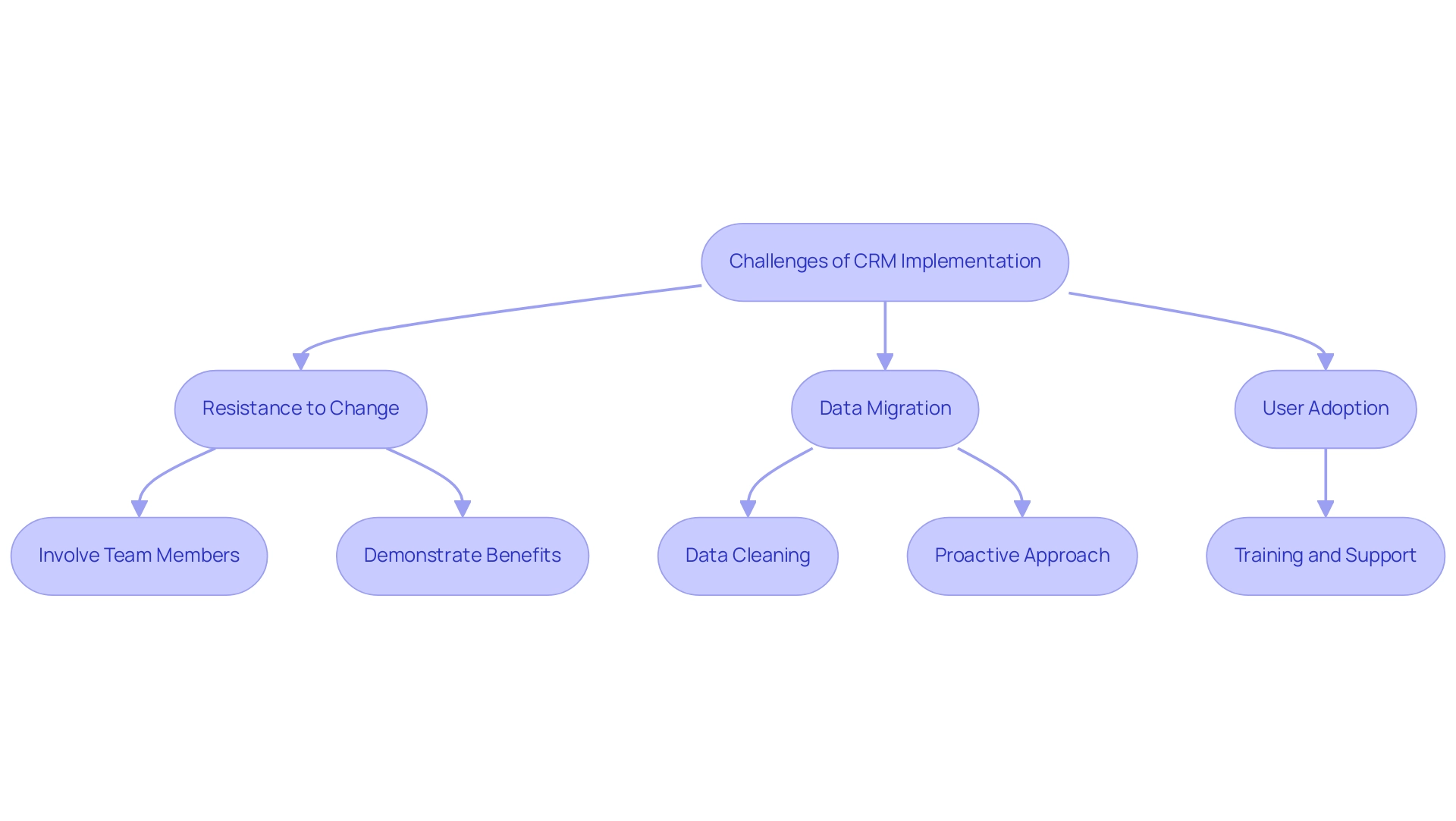
Choosing the Right CRM Software: Key Considerations
Choosing the appropriate CRM software definition is a crucial decision for organizations, particularly in 2025, where the environment is rapidly evolving. Key considerations include:
- Budget
- Scalability
- Ease of use
- Integration capabilities
Establishing clear organizational requirements and identifying specific challenges are essential steps to ensure that the chosen CRM software definition aligns with operational goals.
Budget allocation is a significant factor, especially for small enterprises that often face constraints. Recent statistics indicate that a substantial portion of small businesses are re-evaluating their CRM budgets to ensure effective allocation, with many prioritizing tools that enhance productivity and client satisfaction. In fact, CRM systems have been shown to enhance employee productivity by 15% and increase satisfaction for 75% of organizations. This means that organizations must be strategic in their investments.
However, it is concerning that only 28% of organizations are satisfied with their tools to create a shared, centralized perspective of clients, highlighting the critical need for careful selection. Scalability is another essential factor; companies must select a CRM that adheres to the CRM software definition, allowing it to adjust to their growth and accommodate expanding client data and evolving operational requirements. Real-world examples illustrate how companies that invested in scalable CRM solutions were able to enhance their customer engagement and streamline processes effectively. For instance, a case study on CRM automation revealed that 85% of sales representatives found self-service tools to be effective, underscoring the importance of automation in maintaining competitiveness.
Hinal Tanna, an SEO strategist and content marketer, emphasizes the importance of evaluating CRM vendors thoroughly, stating, "I like to spend my time exploring new places," which reflects the need for organizations to explore various options before making a decision. Ease of use cannot be overlooked, as a user-friendly interface can significantly impact adoption rates among employees. Additionally, evaluating the vendor's support and training offerings is crucial, as these resources can greatly influence the success of the CRM implementation.
By carefully considering these factors, organizations can make informed decisions that not only meet their current needs but also position them for future growth.
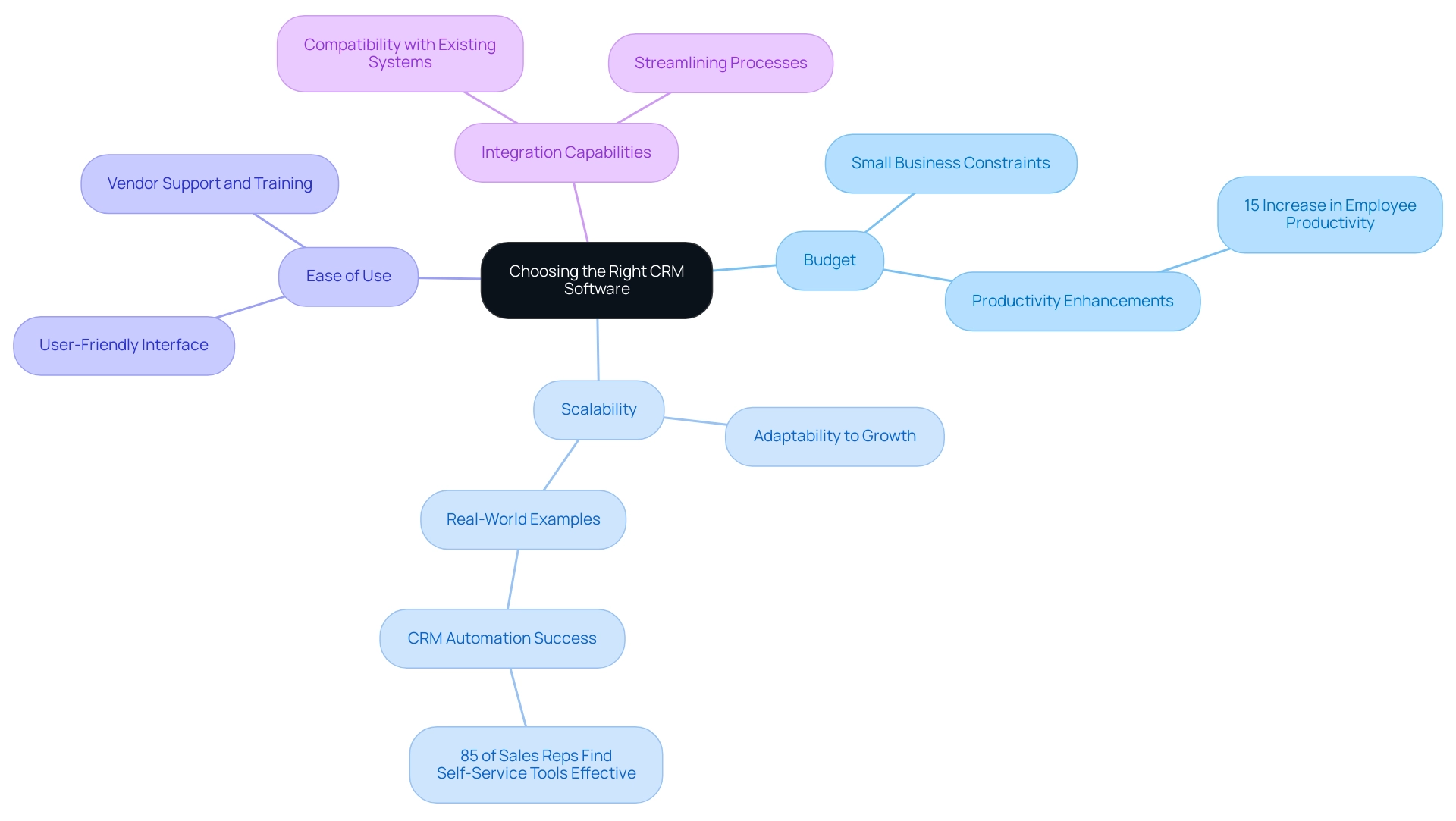
How CRM Software Enhances Customer Experience and Satisfaction
Freelancers often grapple with the complexities of expense management, which can be time-consuming and confusing. Kulud significantly enhances this experience by automating the process of expense management. This innovative platform provides users with a holistic view of their financial data, enabling them to efficiently manage invoices and receipts. By automating the extraction and categorization of financial documents from users' inboxes, Kulud allows for personalized interactions with financial data, timely follow-ups on missing invoices, and proactive management of expenses. These features are crucial in today’s competitive landscape.
Furthermore, Kulud streamlines communication between users and their accountants, ensuring that financial inquiries and issues are resolved swiftly. This interconnectedness not only improves response times but also fosters a cohesive approach to financial management. As a result, freelancers and small enterprise owners who utilize Kulud effectively cultivate stronger financial oversight, leading to heightened efficiency and satisfaction.
Statistics reveal that users of Kulud experience a significant reduction in time spent on accounting tasks—from hours to just minutes—allowing them to focus on growing their businesses. For instance, Georgi Knyazhev, a freelancer, noted, "Instead of spending 3 hours each month searching for and collecting invoices for my companies in Estonia, I now spend just 5 minutes. It's a huge time saver."
In addition to this, John Peterson, a senior accountant at Bolt, described Kulud as a "game-changer" for their accounting team, stating that finding invoices for monthly reports is now effortless, which has streamlined their workflow. Jan Džemesjuk, a creative producer and freelancer, shared, "I just started working as a freelancer and accounting is a big and confusing task for me. I am glad that Kulud helps me with a big part of the bookkeeping process."
Testimonials like these underscore the transformative impact of Kulud on accounting processes. By prioritizing automation and user-friendly design, Kulud empowers its users to manage their financial data effortlessly while ensuring data security and accuracy. Advanced encryption keeps user data secure and private, and the platform has undergone a comprehensive Cloud Application Security Assessment (CASA) by Google, validated by the App Defense Alliance (ADA).
If you are looking to simplify your expense management and enhance your financial oversight, consider trying Kulud today.
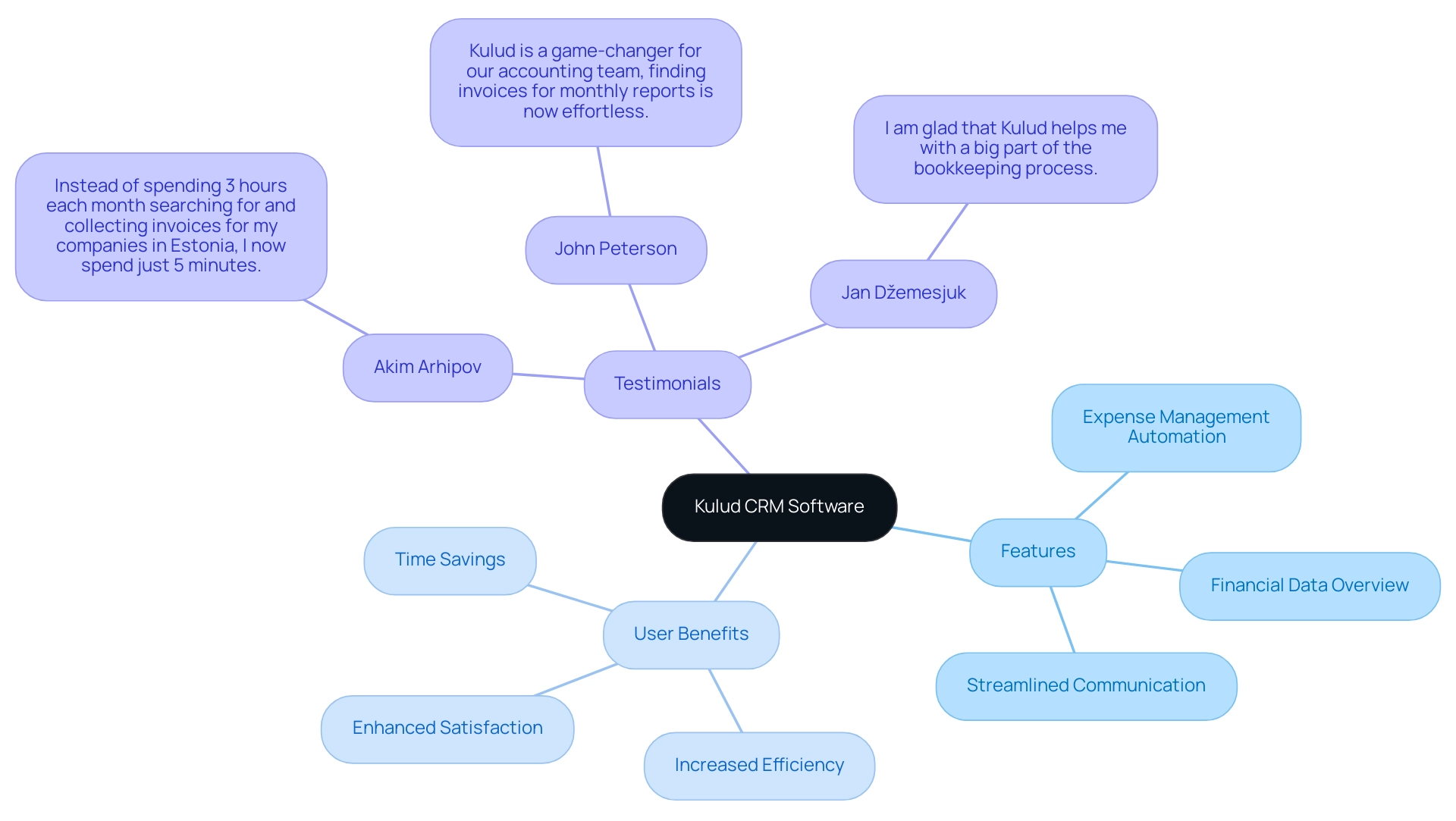
Conclusion
The integration of CRM software into business operations is not merely a trend; it is a fundamental necessity for fostering robust customer relationships and driving growth. By centralizing customer data and automating communication processes, businesses can significantly enhance customer satisfaction and retention rates, leading to increased engagement. The projected growth of the CRM market underscores the pivotal role these systems play in contemporary business strategies.
Understanding the various types of CRM systems—operational, analytical, and collaborative—enables organizations to select the appropriate tools that align with their specific needs. As highlighted throughout the article, the benefits of implementing CRM software extend beyond mere relationship management; they also encompass improved operational efficiency and enhanced decision-making capabilities. However, challenges such as user adoption and data migration must be addressed to fully realize these benefits.
Ultimately, selecting the right CRM software necessitates careful consideration of features, budget, scalability, and ease of use. By prioritizing these factors, businesses can position themselves for sustained growth and success in an increasingly competitive landscape. Embracing CRM technology not only streamlines operations but also paves the way for enriched customer experiences, making it an indispensable asset for any forward-thinking organization.



